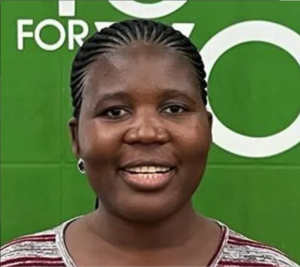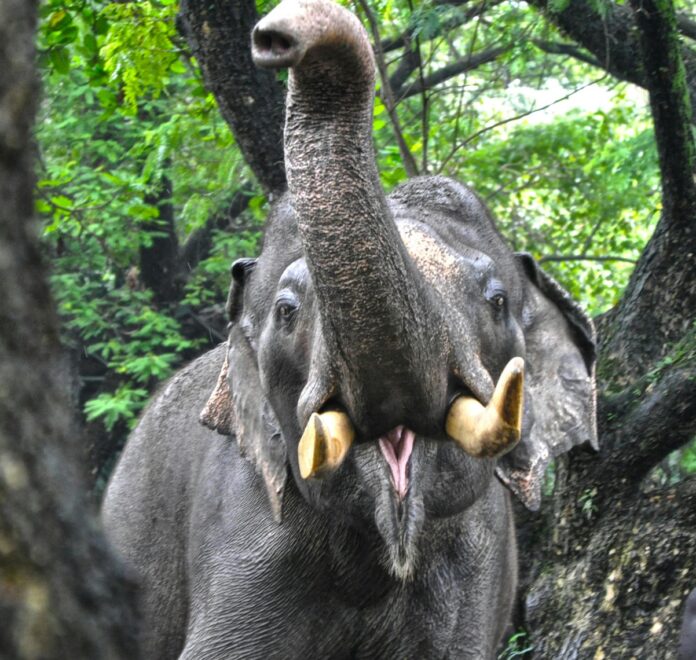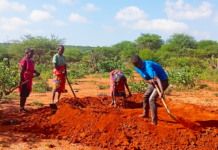By Omboki Monayo
In Botswana, an innovative solution is emerging from the confluence of two significant challenges: the overpopulation of invasive plant species and the presence of large herds of elephants.
According to Dr. Ngonye Keroletswe, the country’s vast elephant population has provided a valuable raw material, which is elephant dung.
“We have large herds of elephants in Botswana, and their dung is, therefore, a good resource for this project,” she told Talk Africa during a recent media workshop hosted by the African Academy of Sciences (AAS).
Elephants, which are large land mammals and herbivores, produce substantial amounts of non-toxic dung, a rich source of cellulose that can be transformed into biodegradable filters, seamlessly integrating into the environment after use.
“Dung is non-toxic, so the cellulose filters decompose naturally and become a natural part of the environment. We are using it to develop an affordable cellulose water filter,” Dr. Keroletswe tells Talk Africa.
Additionally, Botswana struggles with containing invasive plant species like mesquite, which is originally from Mexico and was introduced into the country to combat fires.
“The hardy mesquite plant originates in Mexico, but now grows in Botswana. Some even farm it and use it as a hedge around their farms,” she says. “Initially, it was introduced to fight fire. Somehow it has gone out of control, and grows everywhere, reducing pasture land and making grass inaccessible to livestock,” adds the chemistry researcher.
Dr Keroletswe indicates that current government efforts to contain the plants have so far proven unsuccessful.
“Our government has been putting money into the extermination or extinction of mesquite. Despite funding and ongoing efforts, elimination of the plant is hard because once it is uprooted, the branch or root that falls somewhere else takes root and grows into another plant,” she says.
Dr. Keroletswe explains that the plant is widely available because of its resilience and ease of adaptation to the Botswana environment. This proliferation has however come with several challenges, including the drying up of boreholes in some areas.
“The species grow easily and does not need much water. It has proliferated uncontrollably, reducing pasture land and tapping into vital underground water reserves. Mesquite has a deep root system that occasionally taps into the underground water pans that feed boreholes, drying them up in the process,” she says.
Dr Keroletswe reveals that the invasive plant species have shown lots of promise in the project trials.
In her team’s research, mesquite has been identified as a viable source of materials for the production of a cellulose water filter.
“We are also looking at the use of invasive plant species such as mesquite that can also act as a source of cheap and affordable cellulose filter material. These are plants that invade and overpower the local indigenous plant species,” she reveals. “The best way to get rid of such is to take it to an expert with filtration manufacturing experience to convert it into a usable product,” adds Dr Keroletswe.

She says the cellulose filter is affordable and can be cheaply and affordably produced within local community settings.
The researcher sees the technology as a good way to utilize the plant while reducing its adverse effects.
“These hardy plants offer another source of cellulose for affordable and sustainable water filtration materials. We can use the cellulose derived from such hardy plants to help the locals filter and later bottle the water for sale since it will be purified,” says the scientist and researcher.
Several esteemed institutions, including the ARISE Fund sponsored by the African Academy of Sciences and the Botswana Institute for Technology Research and Innovation (BITRI), are supporting the project which is part of a broader initiative to build local capacity and expertise while enhancing skills and knowledge in developing technologies that benefit the national economy.
She is leading a team of six scientists, including two master’s students, to develop these innovative filtration technologies. One master’s student’s proposal has already received approval from UNISA, while another is researching hydrogels for treating unfiltered water.
“We have 6 scientists working on the project, including 2 Masters students. “The other 2 are working and studying in BITRI. Through the ARISE project sponsored by AAS, we are carrying out capacity building to enhance their skills, knowledge, and experience in developing viable technologies that can contribute to the national economy,” adds the BITRI chemist and researcher.
The cellulose filters and hydrogels being developed aim to remove toxic metals and quaternary ammonia compounds from wastewater.
“One of our team members is modifying plant cellulose to remove anions from wastewater. Preliminary studies show that she has prepared a solvent that can remove 80% of nitrates and phosphates from the water,” says Dr Keroletswe.
The scientist points out that the research is particularly relevant in the post-COVID era, where increased use of sanitizers and detergents has led to higher levels of these compounds in wastewater.
“During the Covid pandemic period, a lot of sanitizers, and detergents that were in use had quaternary ammonia compounds and all of these ended up in our wastewater. The technology will clean up the wastewater. Additionally, efforts are underway to create membranes capable of de-ionizing water, making it suitable for various uses, including safe drinking water,” she says.
By harnessing local resources and scientific expertise, Botswana is poised to transform its environmental challenges into a beacon of innovation in sustainable water filtration. As technology advances, it promises to provide a sustainable, locally produced solution to water purification, turning environmental challenges into economic and health benefits for Botswana and beyond.
The research team plans to commercialize the technology for use both within Botswana and internationally.
“We are also hoping that the technology will be commercialized and licensed for sale in Botswana and the rest of the world,” says Dr. Keroletswe.














